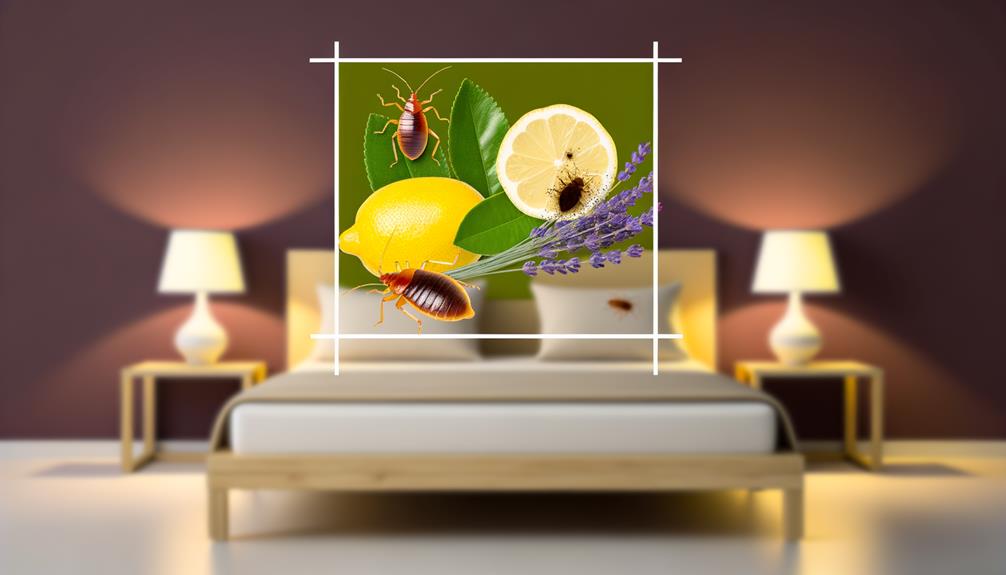As the saying goes, prevention is better than cure, but when it comes to bed bugs, you’re likely looking for an instant solution. You’ve probably heard whispers about certain smells acting as an invisible shield against bed bugs. From the potent aroma of essential oils to the sharp scent of rubbing alcohol, there’s a plethora of options that might just do the trick. But before you start dousing your bedroom in various concoctions, it’s crucial to understand which ones truly hold the power to stop bed bugs in their tracks—and why. Let’s explore the mystery behind these scents and uncover which has the lethal edge.
Key Takeaways
- Cinnamon and eucalyptus oils disrupt bed bug behaviour and can kill them by affecting their nervous system and causing dehydration.
- Citrus extracts like limonene and linalool act as neurotoxins, instantly impacting bed bugs’ nervous systems.
- Rubbing alcohol dehydrates bed bugs rapidly upon contact, making it effective for immediate results.
- Peppermint oil, containing potent neurotoxic properties, can disrupt bed bugs’ nervous systems instantly.
Essential Oils and Bed Bugs

Among the various strategies for combating bed bugs, essential oils have emerged as a promising, natural alternative, warranting a detailed examination of their efficacy and mechanisms of action. You’re part of a community increasingly leaning towards environmentally friendly solutions, and understanding the scientific backbone of these methods is crucial for you. Essential oils, particularly those with cinnamon allure and eucalyptus defence, have shown significant potential in repelling and killing bed bugs.
Cinnamon oil exerts its power through a dual-action mechanism. Firstly, its strong scent acts as a robust repellent, confusing bed bugs and disrupting their feeding and breeding behaviour. Secondly, the compounds within cinnamon oil, especially cinnamaldehyde, directly impact the nervous system of bed bugs, leading to their eventual demise. This makes cinnamon oil not just a deterrent but a lethal weapon against these pests.
Eucalyptus oil, on the other hand, employs a more defensive strategy. Its primary compound, eucalyptol, provides a formidable barrier that bed bugs find difficult to penetrate. When they come into contact with this oil, their exoskeletons are compromised, leading to dehydration and death. This eucalyptus defence essentially creates an inhospitable environment for bed bugs, safeguarding your space from infestation.
The Power of Diatomaceous Earth

You’ve learned about the role of essential oils in combating bed bugs, but now it’s time to explore the efficacy of Diatomaceous Earth (DE). This naturally occurring, silica-based substance has a mechanical action that desiccates bed bugs upon contact, making it a potent addition to your pest control arsenal. Understanding its benefits and the proper application techniques can significantly enhance your strategy against these persistent pests.
Diatomaceous Earth Benefits
Why is diatomaceous earth heralded as a potent weapon against bed bugs? Its microscopic, sharp edges pierce the protective exoskeletons of bed bugs, leading to dehydration and death. This non-toxic, natural substance not only promises a haven from pests but also offers remarkable benefits that extend beyond pest control. For those of you deeply invested in the well-being of your garden, diatomaceous earth plays a pivotal role in improving soil health and has diverse gardening uses. It enhances soil aeration and drainage, making it an indispensable ally for healthy plant growth. Moreover, its natural properties ensure that you’re nurturing your garden in an environmentally friendly manner, fostering a sense of belonging and connection to the earth.
Application Tips
Harnessing the power of diatomaceous earth for bed bug control requires a strategic approach to its application, ensuring maximum effectiveness and safety. When applying, it’s crucial to don protective gear, and adhere to safety precautions to avoid inhalation or skin irritation. Spread the diatomaceous earth thinly across areas where bed bugs are suspected, focusing on cracks, crevices, and underneath furniture. From an analytical perspective, the particle size and shape of diatomaceous earth mechanically damage the exoskeletons of bed bugs, leading to dehydration. This method, while effective, demands patience and precision. Professional advice often recommends a follow-up application to catch any newly hatched bed bugs, ensuring a comprehensive approach to eradication. Remember, integrating these tips into your strategy enhances your belonging to a community committed to effective, safe bed bug control.
Citrus Extracts’ Effectiveness

You’ll find that citrus extracts, primarily limonene and linalool, act as neurotoxins to bed bugs, disrupting their nervous system upon contact. When applying these extracts, it’s crucial to target their habitats directly, ensuring thorough coverage for maximum efficacy. However, you must understand their limitations, as these natural compounds may not penetrate as deeply or act as quickly as synthetic pesticides.
Citrus Extracts’ Mechanism
Citrus extracts, particularly from oranges and lemons, contain limonene, a natural compound known for its potent insecticidal properties that directly target and disrupt the nervous system of bed bugs. This disruption leads to a rapid decrease in bed bug activity, ultimately resulting in their demise. The mechanism behind this citrus toxicity lies in limonene’s ability to penetrate the exoskeleton of bed bugs, interfering with their respiratory system and causing paralysis followed by death. In agricultural uses, this same principle applies, showcasing the versatility and effectiveness of citrus extracts not only in domestic settings but also in broader pest control applications. You’re not alone in your fight against pests; nature’s own solutions stand with you, offering a scientifically-backed method to reclaim your space from unwelcome invaders.
Application Tips
Understanding the potent insecticidal properties of citrus extracts equips you with a natural weapon against bed bugs, but applying this knowledge effectively requires adherence to specific guidelines for maximum impact. Firstly, safety precautions cannot be overstated; ensure well-ventilated areas during application to avoid inhaling concentrated extracts. Secondly, dilute the citrus extracts appropriately to maintain efficacy while minimizing potential harm to surfaces or fabrics. A precise, targeted application on infested areas maximizes the insecticidal effect without waste. Importantly, regular reapplication is necessary, as the volatility of the compounds means they dissipate quickly. Lastly, despite your best efforts, some infestations may persist, necessitating professional consultation to ensure a comprehensive approach to eradication. This blend of scientific rigour and community support underscores the importance of careful application and expert advice.
Effectiveness Limitations
While citrus extracts offer a natural approach to combating bed bug infestations, their effectiveness has inherent limitations that must be carefully considered. You’re part of a community constantly seeking safer, more natural pest control solutions. However, it’s crucial to recognize that these natural remedies, like citrus extracts, might not always provide the comprehensive solution you hope for. Scientific analysis shows that bed bugs, over time, can develop chemical resistance to various substances, including natural ones. This adaptability means that solely relying on citrus extracts could lead to diminishing returns in your fight against these pests. Furthermore, compared to heat treatments, which penetrate deep into hiding spots and kill bed bugs at all life stages, citrus extracts have a much narrower scope of action. Heat treatments offer a more robust, often more effective solution for eradicating bed bugs comprehensively.
The Role of Rubbing Alcohol

Rubbing alcohol, often employed as a disinfectant, also plays a crucial role in the extermination of bed bugs by rapidly dehydrating their bodies upon contact. This method, while effective in the short term, raises two significant considerations: alcohol resistance and safety concerns. Through the lens of entomology, it’s understood that repeated exposure to a singular extermination method, such as alcohol, may lead to the development of resistance within bed bug populations. This resistance diminishes the long-term efficacy of rubbing alcohol as a standalone solution.
Moreover, the application of rubbing alcohol requires careful consideration of safety concerns. Its high volatility makes it a fire hazard, especially in enclosed spaces where it might be used liberally to combat bed bug infestations. This necessitates a strategic approach to its use, prioritizing well-ventilated areas and avoiding sources of ignition.
In the broader context of bed bug management, the role of rubbing alcohol is best viewed as a supplemental strategy. It provides immediate, albeit temporary, relief by killing bed bugs on contact. However, it’s imperative to integrate it with a comprehensive pest control plan, addressing the potential for alcohol resistance and adhering to safety guidelines to ensure effectiveness and prevent harm.
Using Neem Oil Strategically

Neem oil, a natural pesticide derived from the seeds of the neem tree, offers an eco-friendly and effective approach to bed bug management when used correctly. The key to its success lies in the strategic application and understanding of its properties. Neem oil functions by disrupting the life cycle of bed bugs, acting as an antifeedant, repellent, and egg-laying deterrent, making it a comprehensive solution.
Neem cultivation plays a crucial role in the effectiveness of neem oil, as the quality of the oil can vary significantly depending on the cultivation practices. Organic and sustainably farmed neem products ensure a high concentration of azadirachtin, the compound responsible for its pesticidal properties.
However, it’s essential to address safety concerns associated with neem oil use. Although it is a natural product, incorrect application can lead to skin irritation or adverse reactions in pets. Thus, it’s vital to follow usage instructions meticulously, wear gloves during application, and ensure the room is well-ventilated.
Lavender’s Lethal Impact

Lavender oil, recognized for its calming scent, also possesses potent insecticidal properties that can prove fatal to bed bugs upon contact. This essential oil, derived from lavender cultivation, disrupts the nervous system of these pests, leading to their instant demise. You’re not just using a natural remedy; you’re embracing a method steeped in the tradition of aromatic therapy, which has been cherished for centuries.
Diving deeper into the science, lavender oil contains compounds like linalool and linalyl acetate, which are primarily responsible for its efficacy against bed bugs. These components interfere with the receptors in the pests, rendering them unable to perform basic survival functions. It’s a testament to how advancements in understanding natural products can lead to effective, environmentally friendly pest control solutions.
Peppermint Magic Against Bed Bugs

Similarly to lavender oil, peppermint oil offers a potent, natural solution against bed bugs, leveraging its high menthol content to disrupt these critters’ nervous systems effectively. This peppermint toxicity isn’t just conjecture; it’s grounded in the compound’s ability to interfere with the bed bugs’ essential biological processes, rendering them unable to survive in an environment saturated with this distinct aroma.
Digging deeper, the menthol in peppermint oil acts as a neurotoxin to bed bugs, essentially overloading their sensory pathways. This overload leads to paralysis and, ultimately, death, making peppermint oil a formidable foe against these pests. It’s this precise, targeted action that sets peppermint apart as a go-to method for those of you seeking an alternative to chemical treatments.
Furthermore, the alternative uses of peppermint oil extend beyond pest control. Its applications range from aromatherapy, which promotes relaxation and stress reduction, to natural remedies for headaches and digestive issues. This versatility not only makes peppermint oil a valuable tool in your household’s defence against bed bugs but also enriches your wellness arsenal, fostering a sense of belonging and care within the community committed to natural, holistic living practices.
You may also enjoy reading this article
Was This Article Helpful?
- Please provide feedback and comments to help us improve our content.
- Share your experiences and any additional tips you have for dealing with pests.
Share this Post



